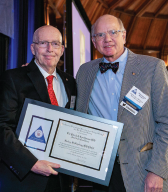Brookhouser Awarded to Stanley Shapshay, MD

Stanley Shapshay, MD with Sigsbee Duck, RPh, MD. © Robert Bruni, Ambience Photography
Stanley Shapshay, MD, professor of otolaryngology at Albany Medical College in Albany, NY, received this year’s Patrick E. Brookhouser Award of Excellence, for “significant scientific and service contributions to the society.” Dr. Shapshay is a past president of the Triological Society, the American Laryngological Association, and the American Broncho-Esophagological Association. He has nearly 200 scientific publications to his name, along with three books and 40 book chapters.
Explore This Issue
March 2019“He has promoted the field of otolaryngology, contributing state-of-the art research and clinical strides in otolaryngology,” Dr. Duck said. “It must be noted that, like Pat Brookhouser, Dr. Shapshay’s service to the Triological Society has been extraordinary. … He is the embodiment of what the award is intended to recognize: excellence.”
Dr. Shapshay, in his remarks, praised Dr. Brookhouser, with whom he was close friends.
“Three words come to mind about Pat: a leader—every sense of the word, fine individual. Mentor. Excellent physician,” he said. “I’m very honored to receive this award.”
Thomas R. Collins is a freelance medical writer based in Florida.
Gene expression, extranodal extension, and opioid use explored in award-winning research
 The Triological Society 2018 Thesis with Distinction Award was given to Jose Pedro Zevallos, MD, MPH, associate professor of otolaryngology–head and neck surgery at Washington University in St. Louis, Mo., who presented his work at the Triological Society Combined Sections Meeting.
The Triological Society 2018 Thesis with Distinction Award was given to Jose Pedro Zevallos, MD, MPH, associate professor of otolaryngology–head and neck surgery at Washington University in St. Louis, Mo., who presented his work at the Triological Society Combined Sections Meeting.
His thesis examined gene expression in HPV-negative oral cavity (OCSCC) and laryngeal (LSCC) squamous cell carcinoma. Researchers—who examined head and neck cancer cases from the Cancer Genome Atlas — found “substantive differences in the distribution of gene expression patterns in OCSCC and LSCC.”
OCSCC cases, Dr. Zevallos and his team observed, mostly comprised mesenchymal and basal subtypes, and LSCC cases were mostly classical and atypical subtypes. The mesenchymal subtype—characterized by epithelial to mesenchymal transition expression—was significantly associated with nodal metastases in OCSCC. In a sub-analysis of T1-2N0M0 OCSCC tumors, the mesenchymal subtype was predictive of occult nodal metastases.
In LSCC, they found, the classical subtype—characterized by KEAP1/NRF2 pathway alterations—was associated with significantly worse overall survival.
 The Paul H. Holinger, MD, Resident Research Award went to Eric L. Bauer, MD, a resident in otolaryngology-head and neck surgery at Washington University in St. Louis, Mo. Dr. Bauer and his colleagues conducted a retrospective review of HPV-positive oropharyngeal SCC cases in the National Cancer Database from 2010 to 2015 to assess the prognostic value of extranodal extension (ENE) in these cases. They found that those that were ENE-negative had the highest five-year survival rate. ENE-positivity, researchers found, was associated with almost twice the hazard of death when compared with ENE-negative cases.
The Paul H. Holinger, MD, Resident Research Award went to Eric L. Bauer, MD, a resident in otolaryngology-head and neck surgery at Washington University in St. Louis, Mo. Dr. Bauer and his colleagues conducted a retrospective review of HPV-positive oropharyngeal SCC cases in the National Cancer Database from 2010 to 2015 to assess the prognostic value of extranodal extension (ENE) in these cases. They found that those that were ENE-negative had the highest five-year survival rate. ENE-positivity, researchers found, was associated with almost twice the hazard of death when compared with ENE-negative cases.